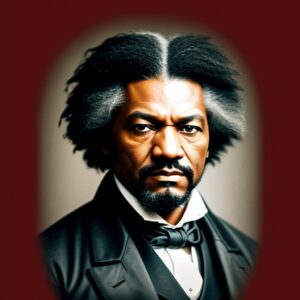1st PUC English Question and Answer: Frederick Douglass
Looking for 1st PUC English textbook answers? You can download Chapter 10: Frederick Douglass Questions and Answers PDF, Notes, and Summary here. 1st PUC English solutions follow the Karnataka State Board Syllabus, making it easier for students to revise and score higher in exams.
Karnataka 1st PUC English Textbook Answers—Reflections Chapter 10
Frederick Douglass Questions and Answers, Notes, and Summary
1st PUC English Chapter 10
Frederick Douglass
Scroll Down to Download Frederick Douglass PDF
Frederick Douglass Comprehension I:
Question 1.
What prevented the slaves from knowing their birth days?
Answer:
He has not seen any authentic record containing it.
Question 2.
What was whispered about Douglass’ parentage?
Answer:
He was admitted to be such by all he ever heard speak of my parentage. The opinion was also whispered that his master was his father; but of the correctness of this opinion.
Question 3.
When was Douglass separated from his mother?
Answer:
When he was an infant, he was separated from his mother.
Question 4.
What was the penalty to the field hand for not being in the field at sunrise?
Answer:
Whipping is the penalty to the field hand for not being in the field at sunrise.
Question 5.
How old was Douglass when he lost his mother?
Answer:
Douglass was seven years old when he lost his mother.
Question 6.
Name the person who was believed to be both Douglass’ father and master.
Answer:
Anthony was the name of Douglass’ father and master.
Question 7.
What was Mr. Plummer?
Answer:
Mr. Plummer was a miserable drunkard, a profane swearer, and a savage monster.
Question 8.
How would the master look at the inquiries about the slaves’ birthday?
Answer:
The large part of the slaves know as little of their 1941 ages as horses know of theirs, and it is the wish of most masters within my knowledge to keep their slaves thus ignorant. He did not remember to have ever met a slave, thus ignorant.
The white children could tell their ages.
He was not allowed to make any inquiries of his master concerning it. He deemed all such inquiries on the part of a slave improper and impertinent and evidence of a restless spirit.
Frederick Douglass Comprehension II:
Question 1.
Why wasn’t Douglass affected much by his mother’s death?
Answer:
He never saw his mother, to know her as such, more than four or five times in his life, and each of these times was very short in duration, and at night. He d not recollect of ever seeing his mother by the light of day. She was with him in the night.
She would lie down with him. And get him to sleep, but long before he woke, she was gone. Very little communication ever took place between them. He received the tidings of her death with much the same emotions he should have probably felt at the death of a stranger.
Frederick Douglass Comprehension III:
Question 1.
What kind of hardships did the slave suffer at the hands of the slaveholder and his mistress?
Answer:
The slaveholder was a miserable drunkard, a profane swearer, and a savage monster. He always went armed with a cow skin and a heavy cudgel. The speaker had known him to cut and slash the women’s heads so horribly that even the master would be enraged at his cruelty and would threaten to whip him if he did not mind himself. He would at times seem to take great pleasure in whipping a slave.
He had often been awakened at the dawn of day by the most heartbreaking shrieks of an own aunt of mine, whom he used to tie up to a joist and whip upon her naked back till she was literally covered with blood.
No words, no tears, no prayers from his gory victim seemed to move his iron heart from its bloody purpose. The louder she screamed, the harder he whipped, and where the blood ran fastest, there he whipped longest.
He would whip her to make her scream and whip her to make her hush, and not until overcome by fatigue would he cease to swing the blood-clotted cow skin.
Question 2.
How does the passage comment on the dreadful experience of slavery?
Answer:
It is a miserable experience being a slave. The author did not see his mother very often, even though he never saw her more than four or five times in his life. She lived about twelve miles from his home. She was hired by Mr. Stewart.
She came to meet him very rarely; only at night did she make her travel to see him on foot. She was a field hand, and whipping is the penalty of not being in the field at sunrise unless a slave has special permission from his or her master to the contrary. She seldom gets permission. It is like a burning hell to live under slavery.
Question 3.
In spite of the hardships he suffered as a slave, why does the author say, ‘Slavery would not always be able to hold me within its foul embrace’?
Answer:
‘Slavery would not always be able to hold me within its foul embrace’ This is the living word of faith and spirit of hope departed not from him, but he remained like ministering angels to cheer him through the gloom.
This truly led him to go out of slavery and be a model for all the slaves. He became the first one who was writing an autobiography on his own life. His faith had made him a leader and a model for others.
Through his power of words, there were many changes taking place in the country. When he was in slavery he used to think of the future life. The burning desire had not quenched for long. He made it possible to act. He often thought of the freedom of the slaves.
Frederick Douglass Summary

Frederick Douglass is one of the most celebrated figures in African American literature. His autobiography, *Narrative of the Life of Frederick Douglass, An American Slave*, was published in 1845, just seven years after he escaped from slavery.
Douglass’ story starts with his birth and childhood, and each new version of his narrative highlights how closely his life was intertwined with significant events in American history.
Douglass begins his narrative by recounting what he knows about his birth. He was born in Tuckahoe, near Hillsborough, about twelve miles from Easton, in Talbot County, Maryland. He has no accurate knowledge of his age. His mother, Harriet Bailey, was the daughter of Isaac and Betsey Bailey, both of whom were dark-skinned and enslaved. Douglass believes his father was a white man, possibly his master.
Separated from his mother as an infant, Douglass only saw her four or five times in his life. His mother was hired out to a Mr. Stewart, who lived about twelve miles away. She would walk the entire distance at night, after completing her day’s work, just to see him. Douglass never saw his mother by daylight; she would lie down with him at night, putting him to sleep, but she was always gone by the time he woke up. Their communication was minimal, and she passed away when he was about seven years old. Douglass was not allowed to be with her during her illness, death, or burial.
Douglass explains how slave masters, including his own, often sold their enslaved children out of deference to their white wives’ feelings, a cruel act that involved selling their own children to slave traders.
Douglass had two masters. His first master, Captain Anthony, was not considered wealthy, owning two or three farms and about thirty slaves. An overseer named Plummer managed the farms and slaves. Plummer was a wretched drunkard, known for his profanity and cruelty. Captain Anthony himself was a harsh and brutal man, hardened by a lifetime of slaveholding. He often seemed to derive pleasure from whipping his slaves.
From a young age, Douglass developed a deep conviction that slavery would not always confine him. He believed this hopeful spirit was a gift from God, to whom he offered his gratitude and praise.
